人教版英语九年级Unit12单元知识点归纳
人教版九年级英语unit12知识点归纳
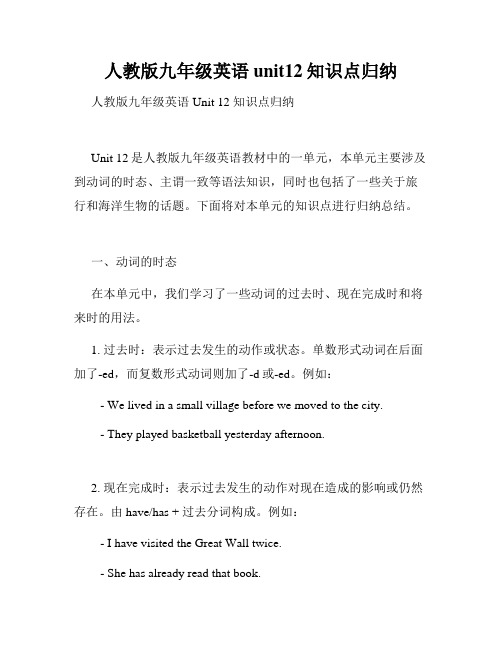
人教版九年级英语unit12知识点归纳人教版九年级英语Unit 12 知识点归纳Unit 12是人教版九年级英语教材中的一单元,本单元主要涉及到动词的时态、主谓一致等语法知识,同时也包括了一些关于旅行和海洋生物的话题。
下面将对本单元的知识点进行归纳总结。
一、动词的时态在本单元中,我们学习了一些动词的过去时、现在完成时和将来时的用法。
1. 过去时:表示过去发生的动作或状态。
单数形式动词在后面加了-ed,而复数形式动词则加了-d或-ed。
例如:- We lived in a small village before we moved to the city.- They played basketball yesterday afternoon.2. 现在完成时:表示过去发生的动作对现在造成的影响或仍然存在。
由have/has + 过去分词构成。
例如:- I have visited the Great Wall twice.- She has already read that book.3. 将来时:表示将来要发生的动作或存在的状态。
由will + 动词原形构成。
例如:- We will go to the beach tomorrow.- They will have a party next week.二、主谓一致主谓一致是指主语和谓语在人称和数上保持一致。
在本单元中,我们需要特别注意以下几点:1. 主语为第三人称单数时,谓语动词需要加-s或-es。
例如:- He often goes to the cinema on weekends.2. 表示时间、距离、金钱等的量词作主语时,谓语动词的单复数形式与它们代表的数量有关。
例如:- Ten yuan is enough to buy a drink.三、旅行话题在本单元中,我们学习了一些与旅行相关的词汇和句型,并通过对话的形式来进行实际应用。
人教版英语九年级上册Unit12 知识点详解
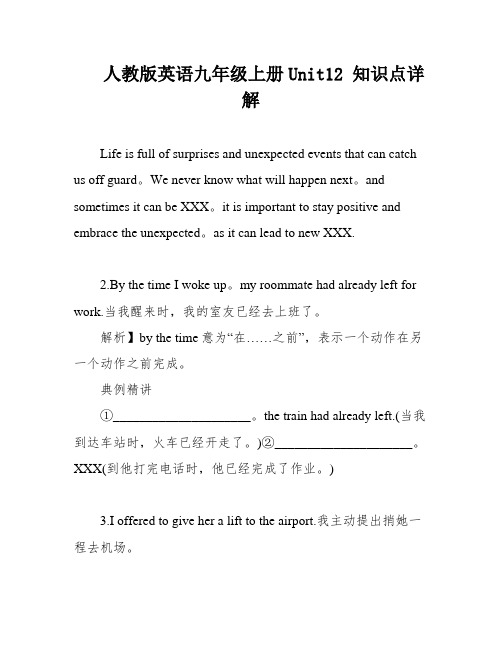
人教版英语九年级上册Unit12 知识点详解Life is full of surprises and unexpected events that can catch us off guard。
We never know what will happen next。
and sometimes it can be XXX。
it is important to stay positive and embrace the unexpected。
as it can lead to new XXX.2.By the time I woke up。
my roommate had already left for work.当我醒来时,我的室友已经去上班了。
解析】by the time意为“在……之前”,表示一个动作在另一个动作之前完成。
典例精讲①_____________________。
the train had already left.(当我到达车站时,火车已经开走了。
)②_____________________。
XXX(到他打完电话时,他已经完成了作业。
)3.I offered to give her a lift to the airport.我主动提出捎她一程去机场。
解析】give…a lift意为“捎(某人)一程”,表示主动提供搭载某人的服务。
典例精讲①Can you _________________________to the train n。
(你能开车送我去火车站吗?)②I___________________________to the supermarket。
(我主动提出开车送她去超市。
)4.The alarm clock went off。
and I rushed out of bed.闹钟响了,我立刻从床上跳起来。
解析】go off意为“响铃”,表示闹钟、警报等声音的响起。
典例精讲①The fire alarm _________________________。
人教版英语九年级全册Unit 12知识点详解及练习
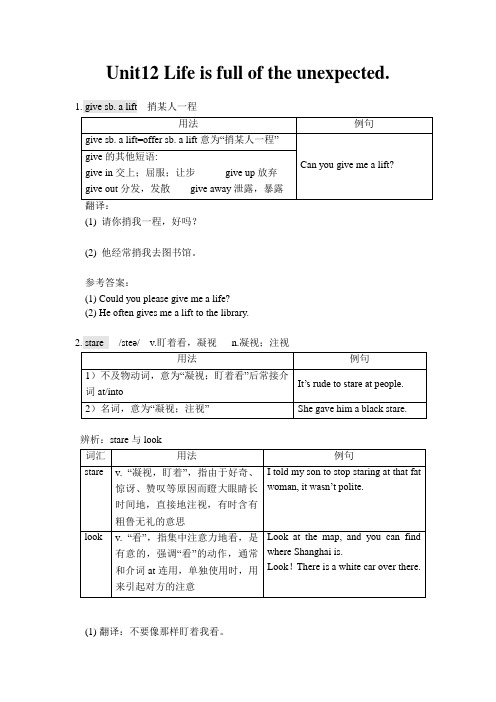
Unit12 Life is full of the unexpected.1. give sb. a lift 捎某人一程(1) 请你捎我一程,好吗?_______________________________________________________________ (2) 他经常捎我去图书馆。
_______________________________________________________________ 参考答案:(1) Could you please give me a life?(2) He often gives me a lift to the library.2. stare /steə/ v.盯着看,凝视n.凝视;注视辨析:stare与look(1)翻译:不要像那样盯着我看。
___________________________________________________________________ (2) Emily ____ the young man hard and finally shamed him into giving up his seatto the old lady.A. stared onB. stared atC. stared forD. stared with参考答案:(1) Don’t stare at me like that.(2) B3. above /əˈbʌv/ prep.在...上面adv.在上面辨析:above,on与over选词填空:above/on/over(1)The plane is flying _____ the clouds.(2)There are five books _____ the desk.(3)There is a bridge _____ the river.(4)I hope the price of the dress will not be____$20.参考答案:(1)above (2)on (3)over (4)above4. burn /bɜ:n/ v.着火;燃烧burn--burnt / burned--burnt / burned辨析:burn, burned与burning(1)翻译:燃烧的旅馆位于城市中心。
九年级英语下教案人教版Unit12语言点归纳

Unit12语言点归纳1. be supposed to do .应该如:We are supposed to stop smoking. 我们应该停止吸烟。
知识拓展表示应该的词有:should, ought to ,be supposed to2. shake hands握手shake 本意是“摇动、震动”3. You should have asked what you were supposed to wear.你本应该问清楚怎么样穿才得体。
中的“should have asked”是“情态动词+现在完成时”表示过去本应该做某事,事实上没有做如:She should have gone to Beijing. 她本应该去了北京。
(没有去)4. be relaxed about sth.对某事随意、不严格如:They are relaxed about the time. 他们对时间很随意。
5. pretty adv. 相当,很=very She is pretty friendly. 她相当友好。
adj. 美丽的She is a pretty girl.她是一个美丽的女孩。
6. make plans to do == plan to do. 打算做某事如:She has made plans to go to Beijing.==She has planed to go to Beijing.7. drop by 访问看望拜访串门We just dropped by our friends’ homes.我们刚刚去朋友家串门。
8. on time 按时9.after all 毕竟终究如:You see I was right after all.你看,毕竟还是我对了。
10. invite sb. to do sth. 邀请某人做某事如:Lily invited me to have dinner.莉莉请我吃晚饭。
九年级英语人教版新课标Unit12. Life is full of the unexpected知识点详解..

Unit12. Life is full of the unexpected课文知识点详解Section A.1.Life is full of the unexpected. 生活充满了意外。
(标题)【解析1】be full of = be filled with充满,装满【解析2】unexpected adj. 出乎意料的;始料不及的the unexpected “意外的事情”“出乎意料的事”。
the +adj.表示一类人或事物。
英语中,有些形容词与定冠词the连用,表示一类人或事物,在句子中起名词的作用。
the homeless (无家可归者) the disabled(残疾人)2. By the time I got outside, the bus had already left. 当我出来时,公共汽车已经离开了。
(1b)【解析】by the time 在……以前,指从过去的某一点到从句所示的时间为止,常引导表示过去的时间状语从句,主句常用过去完成时,即had+动词过去分词。
By the time I got up, he had already left. 当我起床时,他已经离开了。
【拓展】by now 表示“到现在为止”,通常与现在完成时连用。
By now I have collected 200 dolls. 到现在为止,我已收集了二百个布娃娃。
3. When I got to school, I realized I had left my backpack at home.(1b)当我到学校时我意识到我把书包忘在家里了。
【解析】leave sth. +地点“把某物忘在某处”forget意为“遗忘某物”,指忘记一件具体的东西,但不能有具体的地点。
I left my book on the desk. 我把书忘在了桌子上。
I forgot my umbrella yesterday .我昨天忘了带伞。
人教版九年级下册英语12单元知识点总结
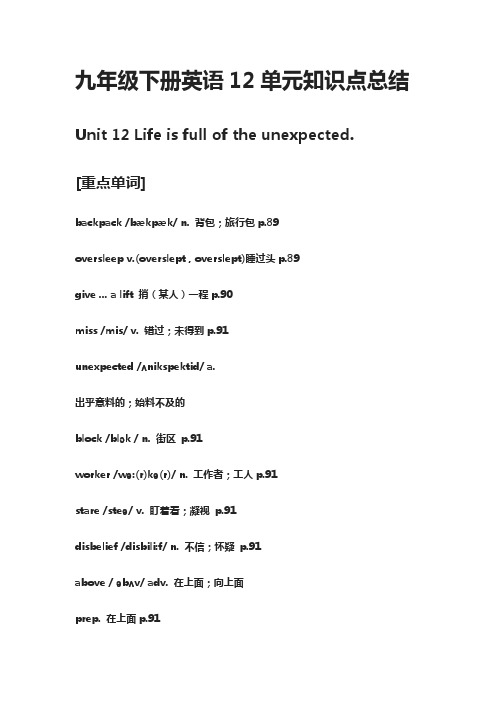
九年级下册英语12单元知识点总结Unit 12 Life is full of the unexpected.[重点单词]backpack /bækpæk/ n. 背包;旅行包p.89oversleep v.(overslept , overslept)睡过头p.89give ... a lift 捎(某人)一程p.90miss /mis/ v. 错过;未得到p.91unexpected /ʌnikspektid/ a.出乎意料的;始料不及的block /blɔk / n. 街区p.91worker /wə:(r)kə(r)/ n. 工作者;工人p.91stare /steə/ v. 盯着看;凝视p.91disbelief /disbili:f/ n. 不信;怀疑p.91above /əbʌv/ adv. 在上面;向上面prep. 在上面p.91burn /bə:(r)n/ v. (burnt /bə:(r)nt/, burned /;burnt, burned) 着火;燃烧p.91alive /əlaIv/adj. 活着;有生气的p.91take off(飞机等)起飞;匆忙离开p.91till /til/ conj. & prep. 到;直到p.91west /west/ adv. 向西;朝西adj. 向西的;西部的n.西;西方p.91 cream /kri:m/ n. 奶油;乳脂p.92boss/bɔs/ n. 老板;领导p.92pie /pai/ n. 果馅饼;果馅派p.92course /kɔ:(r)s/ n. 课程p.92bean /bi:n/ n. 豆;豆荚p.92market /ma:(r)kit/ n. 市场;集市p.92costume /kɔstju:m/ n.服装;装束p.93embarrassed /imbærəst/ adj.窘迫的;害羞的p.93announce /ənauns/ v. 宣布;宣告p.94spaghetti /spəgeti/ n. 意大利面条p.94hoax /həuks/ n. 骗局;恶作剧p.94discovery /diskʌvəri/ n. 发现;发觉p.94lady /leidi/ n. 女士;女子p.94officer /ɔfisə/ n.军官;官员p.94believable /bili:vəbl/ adj.可相信的;可信任的p.95 embarrassing /imbærəsiŋ/ a. 使人害羞的(难堪的或惭愧的)p.95 New Zealand /nju:zi:lənd/ 新西兰p.91Italy /Itəli/ 意大利p.94Mars /ma:(r)z/ 火星p.94Carl /ka:(r)l/ 卡尔(男名)p.90Orson /ɔ:(r)sən/ Welles /welz/ 奥森•韦尔斯p.94【重点短语】1. take a shower 淋浴2. leave my backpack at home 把背包忘在家里3. get back to school 返回学校4. start teaching 开始教学5. go off 响铃6. rush out the door 冲出房门7. give sb a lift 捎某人一程8. miss both events 错过两个事件9. be about to do sth 正要做某事10. stare in disbelief at 难以置信地盯着11. raise above the burning building 从正在燃烧的楼上升起12. jump out of bed 跳下床13. collect the math homework 收数学作业14. show up 赶到,出现【重点句型】1. By the time I got up, my brother had already gotten in the shower. 当我起床时,我哥哥已经进了浴室了。
人教版英语九年级下册unit 12单元 复习课件老师版

单元知识点梳理词汇拓展1.睡过头;睡得太久v. oversleep(过去式) overslept(过去分词) overslept2.工作v./n. work工作者;工人n. worker3.在……上面prep. 在上面adv. above超过,多于;在……上方prep.(近义词) over 在……上prep.(近义词) on4.着火;燃烧v. burn(过去式) burnt/burned (过去分词) burnt/burned 着火的;燃烧的adj.(现在分词) burning5.向西;朝西adv. 向西的;西部的adj. 西;西方n. west向东;朝东adv. 东方的;东部的adj. 东;东方n.(对应词) east6.发现;发觉v. discover发现;发觉n. discovery7.办公室n. office军官;官员n. officer8.相信;认为有可能v. believe可相信的;可信任的adj. believable难以置信的;不真实的adj.(反义词) unbelievable9.出现v. appear消失;不见v.(反义词) disappear词块归纳1.捎……一程give…a lift2.与……成一排in line with3.赶到;露面show up4.在……以前by the time…5.发生;继续go on6.至少;不少于;起码at least7.醒来wake up8.洗脸wash one's face9.从……跳下jump out of...10.变成turn into11.冲出;奔出rush out12.充满;装满be full of13.(飞机等)起飞take off14.(闹铃、警铃等)突然响起go off15.在(某时间点)以前by the end of16.穿上衣服get dressed17.熬夜stay up18.愚人节April Fool's Day19.化装舞会costume party20.卖光sell out21.发生take place22.减肥lose weight23.结婚get married24.着陆land on25.多于;超过more than26.用完;耗尽run out of27.数以百计的;成百上千的hundreds of核心句型1.幸运的是,卡尔的爸爸在街上看见了我并开车捎了我一程。
人教版九年级英语unit12知识点总结
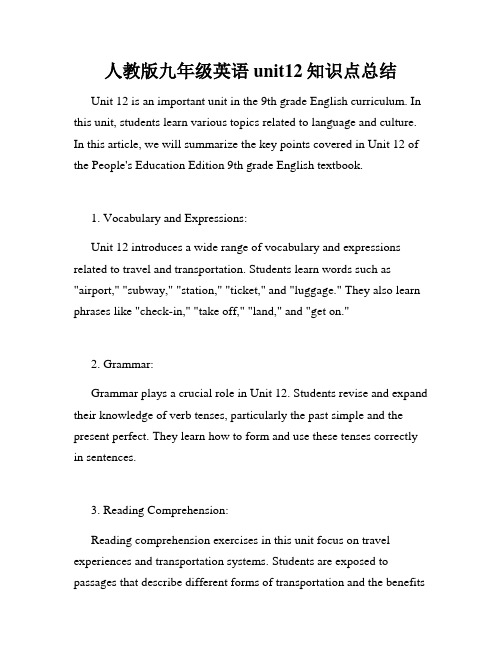
人教版九年级英语unit12知识点总结Unit 12 is an important unit in the 9th grade English curriculum. In this unit, students learn various topics related to language and culture. In this article, we will summarize the key points covered in Unit 12 of the People's Education Edition 9th grade English textbook.1. Vocabulary and Expressions:Unit 12 introduces a wide range of vocabulary and expressions related to travel and transportation. Students learn words such as "airport," "subway," "station," "ticket," and "luggage." They also learn phrases like "check-in," "take off," "land," and "get on."2. Grammar:Grammar plays a crucial role in Unit 12. Students revise and expand their knowledge of verb tenses, particularly the past simple and the present perfect. They learn how to form and use these tenses correctly in sentences.3. Reading Comprehension:Reading comprehension exercises in this unit focus on travel experiences and transportation systems. Students are exposed to passages that describe different forms of transportation and the benefitsand challenges of traveling. They practice answering comprehension questions based on the texts.4. Listening Skills:Unit 12 enhances students' listening skills through various audio materials. They listen to dialogues and conversations related to travel arrangements, booking tickets, and navigating through different transportation systems. Listening exercises improve students' ability to understand spoken English in real-life situations.5. Speaking and Conversation:Unit 12 encourages students to participate in speaking activities and conversations related to travel. Students practice asking and answering questions about their travel experiences, describing places they have visited, and talking about transportation modes they prefer. These activities build their confidence in using English to communicate effectively with others.6. Writing Skills:In Unit 12, students improve their writing skills by composing travelogues and diary entries. They learn how to describe their trips, highlight memorable experiences, and provide recommendations forfuture travelers. Through writing exercises, students develop their creativity and express their thoughts in a coherent manner.7. Cultural Awareness:Unit 12 also incorporates cultural elements to broaden students' understanding of different customs and traditions around the world. Students learn about famous tourist destinations, historical landmarks, and cultural practices in different countries. This helps foster cultural awareness and an appreciation for diversity.8. Practical Application:Unit 12 emphasizes the practical application of English language skills in real-life situations. Students are given opportunities to role-play and simulate scenarios such as booking a hotel, purchasing tickets, and giving directions. This allows them to apply their language skills in meaningful ways.In conclusion, Unit 12 of the People's Education Edition 9th grade English textbook covers various aspects of language and culture related to travel and transportation. Students engage with vocabulary, grammar, reading, listening, speaking, and writing activities. Through these exercises, students not only improve their English language proficiencybut also gain a deeper understanding of different cultures and develop practical skills necessary for traveling.。
(完整版)九年级英语人教版新课标Unit12.Lifeisfulloftheunexpected知识点详解..

Unit12. Life is full of the unexpected课文知识点详解Section A.1.Life is full of the unexpected. 生活充满了意外。
(标题)【解析1】be full of = be filled with充满,装满【解析2】unexpected adj. 出乎意料的;始料不及的the unexpected “意外的事情”“出乎意料的事”。
the +adj.表示一类人或事物。
英语中,有些形容词与定冠词the连用,表示一类人或事物,在句子中起名词的作用。
the homeless (无家可归者) the disabled(残疾人)2. By the time I got outside, the bus had already left. 当我出来时,公共汽车已经离开了。
(1b)【解析】by the time 在……以前,指从过去的某一点到从句所示的时间为止,常引导表示过去的时间状语从句,主句常用过去完成时,即had+动词过去分词。
By the time I got up, he had already left. 当我起床时,他已经离开了。
【拓展】by now 表示“到现在为止”,通常与现在完成时连用。
By now I have collected 200 dolls. 到现在为止,我已收集了二百个布娃娃。
3. When I got to school, I realized I had left my backpack at home.(1b)当我到学校时我意识到我把书包忘在家里了。
【解析】leave sth. +地点“把某物忘在某处”forget意为“遗忘某物”,指忘记一件具体的东西,但不能有具体的地点。
I left my book on the desk. 我把书忘在了桌子上。
I forgot my umbrella yesterday .我昨天忘了带伞。
Unit12+重点短语归纳+2024-2025学年人教版英语九年级全册+
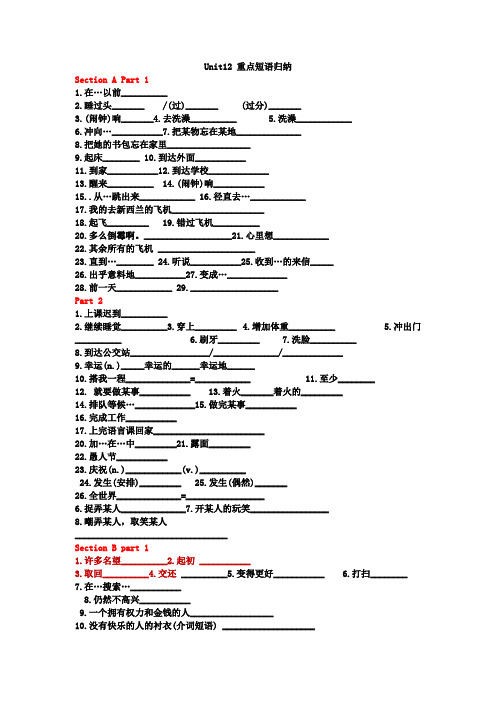
Unit12 重点短语归纳Section A Part 11.在…以前__________2.睡过头_______ /(过)_______ (过分)_______3.(闹钟)响_______4.去洗澡__________5.洗澡____________6.冲向…___________7.把某物忘在某地______________8.把她的书包忘在家里__________________9.起床________ 10.到达外面___________11.到家___________12.到达学校_____________13.醒来__________ 14.(闹钟)响___________15..从…跳出来____________ 16.径直去…____________17.我的去新西兰的飞机____________________18.起飞_________ 19.错过飞机__________20.多么倒霉啊。
___________________21.心里想____________22.其余所有的飞机 _____________________23.直到…________ 24.听说___________25.收到…的来信_____26.出乎意料地___________27.变成…_____________28.前一天____________ 29.___________________Part 21.上课迟到__________2.继续睡觉__________3.穿上_________4.增加体重__________5.冲出门__________6.刷牙_________7.洗脸__________8.到达公交站_________________/______________/_____________9.幸运(n.)_____幸运的______幸运地______10.搭我一程______________=____________ 11.至少________12. 就要做某事___________ 13.着火_______着火的_________14.排队等候…_____________15.做完某事___________16.完成工作___________17.上完语言课回家________________________20.加…在…中_________21.露面_________22.愚人节___________23.庆祝(n.)____________(v.)__________24.发生(安排)_________ 25.发生(偶然)_______26.全世界______________=_________________6.捉弄某人______________7.开某人的玩笑_________________8.嘲弄某人,取笑某人_________________________________Section B part 11.许多名望__________2.起初 ___________3.取回__________4.交还 __________5.变得更好___________6.打扫________7.在…搜索…___________8.仍然不高兴___________9.一个拥有权力和金钱的人__________________10.没有快乐的人的衬衣(介词短语) ____________________11突然________11.虽然 _________12.做…花费某人…时间 _____________________13.如此…以至于…_______________/_____________________14.玩得高兴___________/_________/_______________15.做…高兴_____________ 16.务必做…______________17.对…有把握________________ 18.对做…有把握___________19.想做…1)___________ 2)____________ 3)_____________20.感觉像…________ 21.要么…要么…_________(遵循____原则) …和…两者都不_____________(遵循_______原则)不但…而且…__________________(遵循________原则)22.朋友_______友谊__________23.使我们的友谊更牢靠___________________ 24.迟到的/晚地_____ 以后,随后_______最近的,最新的________25.要求某人(不)做…_______________part 21.眼睛盯着地面________________2.感觉像… _____________3.很沉的重量___________4.在他的肩膀上__________5.独自步行回家___________6.停止考虑…______________7.错过进球____________8.他怎么能做…____________8.使某人失望___________9.输掉比赛____________10.因为(+词组)____________因为(+句子)_________11.开除某人_____________ 12.教练 __________13.一…就…________ 14.(从中间穿过) ______(从表面横过)______ 15.到处,浑身,周遍 ___________16.没再说一句话__________ 17.听见某人在做… ___________18.听见某人做了…____________19.敲他的卧室的门 ____________20.让某人进来___________21.对某人太苛刻____________22.使我的队失败____________23.团队努力__________ 做出努力做某事________________24.互相支持 __________25.而且,还有/除了(包含)________除了(排除)______/_______除了(细节)____________14.和某人交流______________15.从错误中学习_____________Part 31.第二天(过去时)__________2.而不是 __________/__________3.带着勇气而不是恐惧_______________________4.几乎就要做… ___________5.通力协作 __________6.令某人惊讶的是___________7.令某人安心的是_____________8.点头同意 ____________ 9.一个人的过失___________10.给某人提供某物________________/_________________11.同意某人(v.)__________ 12. 虽然________/________13.某人花…时间做…_________________/__________________14.某人付…钱买…_______________15.某物值…钱_____________16.没有权力______________=____________17.主动提出做…______________18.离…近____________19.错过做… _____________ 20. 进球 ____________。
人教版九年级英语第十二单元知识点总结
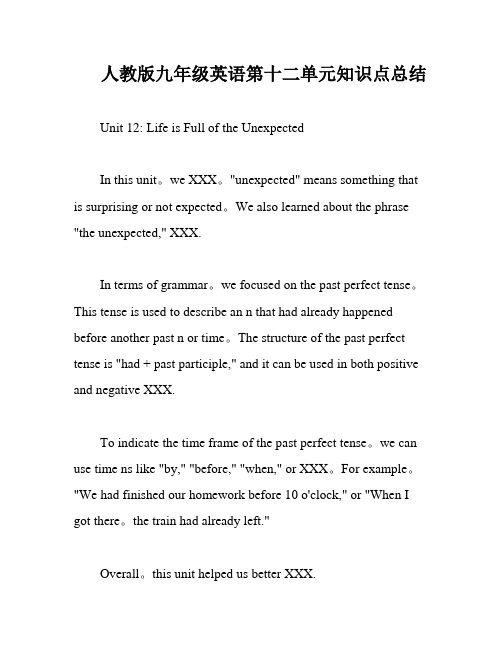
人教版九年级英语第十二单元知识点总结Unit 12: Life is Full of the UnexpectedIn this unit。
we XXX。
"unexpected" means something that is surprising or not expected。
We also learned about the phrase "the unexpected," XXX.In terms of grammar。
we focused on the past perfect tense。
This tense is used to describe an n that had already happened before another past n or time。
The structure of the past perfect tense is "had + past participle," and it can be used in both positive and negative XXX.To indicate the time frame of the past perfect tense。
we can use time ns like "by," "before," "when," or XXX。
For example。
"We had finished our homework before 10 o'clock," or "When I got there。
the train had already left."Overall。
this unit helped us better XXX.XXX XXX to those who have been injured in war。
人教版九年级全一册英语Unit12单元语法知识点总结
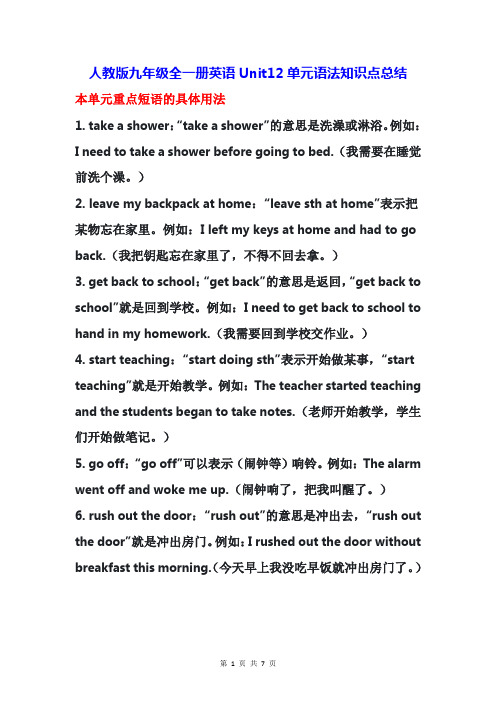
人教版九年级全一册英语Unit12单元语法知识点总结本单元重点短语的具体用法1. take a shower:“take a shower”的意思是洗澡或淋浴。
例如:I need to take a shower before going to bed.(我需要在睡觉前洗个澡。
)2. leave my backpack at home:“leave sth at home”表示把某物忘在家里。
例如:I left my keys at home and had to go back.(我把钥匙忘在家里了,不得不回去拿。
)3. get back to school:“get back”的意思是返回,“get back to school”就是回到学校。
例如:I need to get back to school to hand in my homework.(我需要回到学校交作业。
)4. start teaching:“start doing sth”表示开始做某事,“start teaching”就是开始教学。
例如:The teacher started teaching and the students began to take notes.(老师开始教学,学生们开始做笔记。
)5. go off:“go off”可以表示(闹钟等)响铃。
例如:The alarm went off and woke me up.(闹钟响了,把我叫醒了。
)6. rush out the door:“rush out”的意思是冲出去,“rush out the door”就是冲出房门。
例如:I rushed out the door without breakfast this morning.(今天早上我没吃早饭就冲出房门了。
)7. give sb a lift:“give sb a lift”的意思是让某人搭车、捎某人一程。
人教版九年级英语Unit12知识点总结
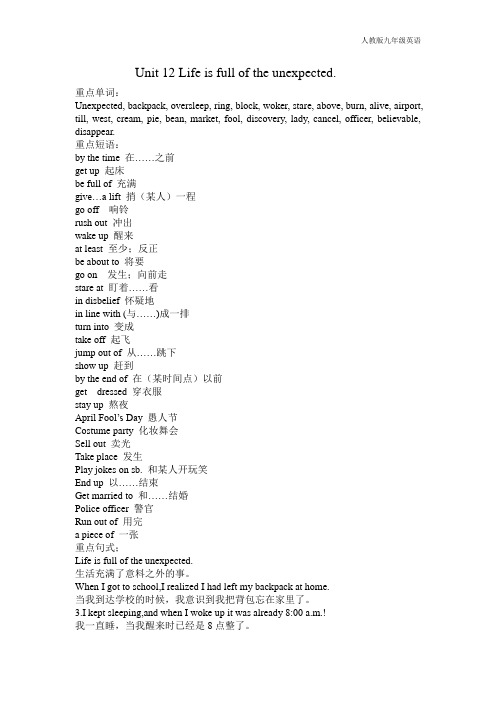
Unit 12 Life is full of the unexpected.重点单词:Unexpected, backpack, oversleep, ring, block, woker, stare, above, burn, alive, airport, till, west, cream, pie, bean, market, fool, discovery, lady, cancel, officer, believable, disappear.重点短语:by the time 在……之前get up 起床be full of 充满give…a lift 捎(某人)一程go off 响铃rush out 冲出wake up 醒来at least 至少;反正be about to 将要go on 发生;向前走stare at 盯着……看in disbelief 怀疑地in line with (与……)成一排turn into 变成take off 起飞jump out of 从……跳下show up 赶到by the end of 在(某时间点)以前get dressed 穿衣服stay up 熬夜April Fool’s Day 愚人节Costume party 化妆舞会Sell out 卖光Take place 发生Play jokes on sb. 和某人开玩笑End up 以……结束Get married to 和……结婚Police officer 警官Run out of 用完a piece of 一张重点句式;Life is full of the unexpected.生活充满了意料之外的事。
When I got to school,I realized I had left my backpack at home.当我到达学校的时候,我意识到我把背包忘在家里了。
人教版九年级英语Unit12单词、课文知识梳理,词汇句式精讲
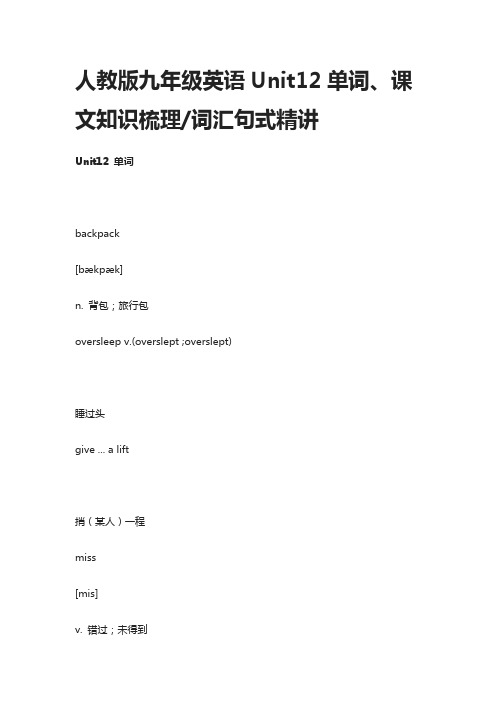
人教版九年级英语Unit12单词、课文知识梳理/词汇句式精讲Unit12 单词backpack[bækpæk]n. 背包;旅行包oversleep v.(overslept ;overslept)睡过头give ... a lift捎(某人)一程miss[mis]v. 错过;未得到unexpected[ʌnikspektid]a.出乎意料的;始料不及的block[blɔk ]n. 街区worker[wə:(r)kə(r)]n. 工作者;工人stare[steə]v. 盯着看;凝视disbelief[disbili:f]n. 不信;怀疑above[ əbʌv]adv. 在上面;向上面pre在上面burn[bə:(r)n]v. (burnt; burned ) 着火;燃烧alive[ əlaIv]adj. 活着;有生气的take off(飞机等)起飞;匆忙离开till[til]conj. & pre到;直到west[west]adv. 向西;朝西adj. 向西的;西部的n. 西;西方cream[kri:m]n. 奶油;乳脂boss[bɔs]n. 老板;领导pie[pai]n. 果馅饼;果馅派course[kɔ:(r)s]n. 课程bean[bi:n]n. 豆;豆荚[ma:(r)kit]n. 市场;集市costume[kɔstju:m]n.服装;装束embarrassed [imbærəst] adj.窘迫的;害羞的announce[ ənauns]v. 宣布;宣告spaghetti[spəgeti]n. 意大利面条hoaxn. 骗局;恶作剧discovery[diskʌvəri]n. 发现;发觉lady[leidi]n. 女士;女子officer[ ɔfisə]n.军官;官员believable[bili:vəbl]adj.可相信的;可信任的embarrassing[imbærəsiŋ]a. 使人害羞的(难堪的或惭愧的)New Zealand[nju:zi:lənd]新西兰Italy[Itəli]意大利Mars[ma:(r)z]火星Carl[ka:(r)l]卡尔(男名)OrsonWelles[ɔ:(r)sən; welz]奥森•韦尔斯Unit12 知识梳理【重点短语】1. take a shower洗浴2. leave my backpack at home 把背包忘在家里3. get back to school 返回学校4. start teaching 开始教学5. go off 响铃6. rush out the door 冲出房门7. give sb a lift 捎某人一程8. miss both events 错过两个事件9. full of unexpected 充满着不可预知性10. be about to do sth 正要做某事11. stare in disbelief at 难以置信地盯着。
人教版英语九年级全册单元unit 12 知识点+测试卷+思维导图
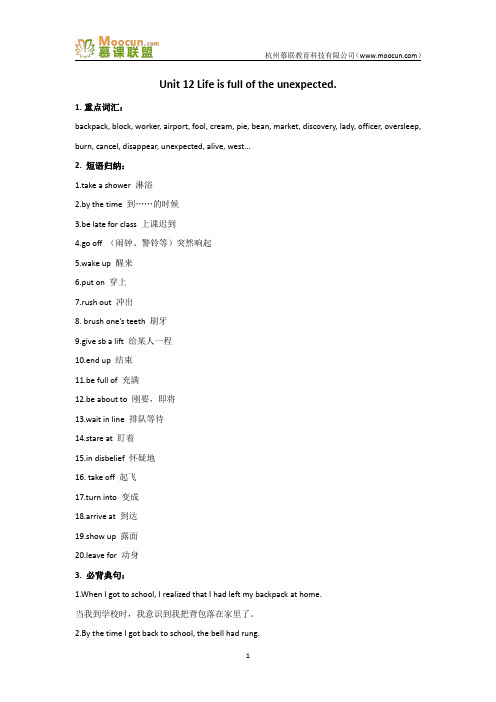
Unit 12 Life is full of the unexpected.1.重点词汇:backpack, block, worker, airport, fool, cream, pie, bean, market, discovery, lady, officer, oversleep, burn, cancel, disappear, unexpected, alive, west...2. 短语归纳:1.take a shower 淋浴2.by the time 到……的时候3.be late for class 上课迟到4.go off (闹钟、警铃等)突然响起5.wake up 醒来6.put on 穿上7.rush out 冲出8. brush one’s teeth 刷牙9.give sb a lift 给某人一程10.end up 结束11.be full of 充满12.be about to 刚要,即将13.wait in line 排队等待14.stare at 盯着15.in disbelief 怀疑地16. take off 起飞17.turn into 变成18.arrive at 到达19.show up 露面20.leave for 动身3. 必背典句:1.When I got to school, I realized that I had left my backpack at home.当我到学校时,我意识到我把背包落在家里了。
2.By the time I got back to school, the bell had rung.当我回到学校时,铃声已经响了。
3. Before I got to the bus stop, the bus had already left.在我到达公共汽车站之前,公共汽车已经开走了。
4. As I was waiting in the line with the other office workers, I heard a loud sound.当我和其他办公室工作人员在排队的时候,我听到了一个很大的声音。
人教版九年级英语第十二单元Unit12知识点+习题
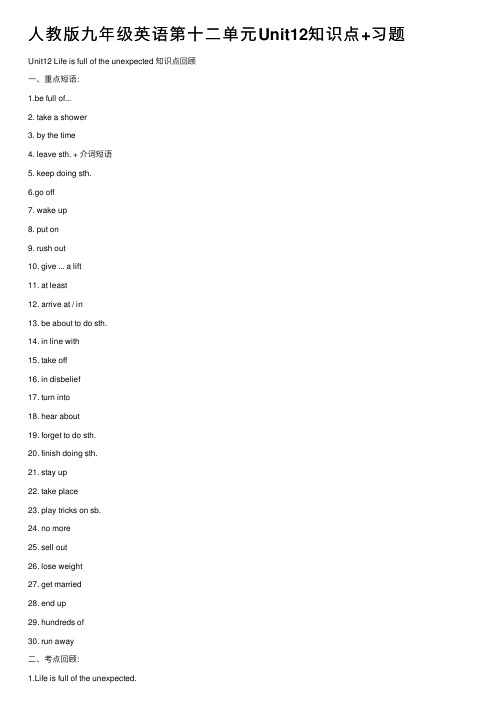
⼈教版九年级英语第⼗⼆单元Unit12知识点+习题Unit12 Life is full of the unexpected 知识点回顾⼀、重点短语:1.be full of...2. take a shower3. by the time4. leave sth. + 介词短语5. keep doing sth.6.go off7. wake up8. put on9. rush out10. give ... a lift11. at least12. arrive at / in13. be about to do sth.14. in line with15. take off16. in disbelief17. turn into18. hear about19. forget to do sth.20. finish doing sth.21. stay up22. take place23. play tricks on sb.24. no more25. sell out26. lose weight27. get married28. end up29. hundreds of30. run away⼆、考点回顾:1.Life is full of the unexpected.【解析1】be full of = be filled with充满,装满①Our life is ______________chances, but there are also a lot of challenges.(充满)②The box is_______________(装满) books.③On hearing the news, her heart was _____ gratitude.A.filled ofB. full withC. filled withD. fill with【2014辽宁丹东】—Look! Here comes Cindy! She is always full of .—So she is. because she takes a lot of exercise every day.A. knowledgeB. courageC. changeD. energy【解析2】unexpected adj. 出乎意料的;始料不及的the unexpected “意外的事情”“出乎意料的事”。
人教版英语九年级Unit12 Section AB知识点讲解
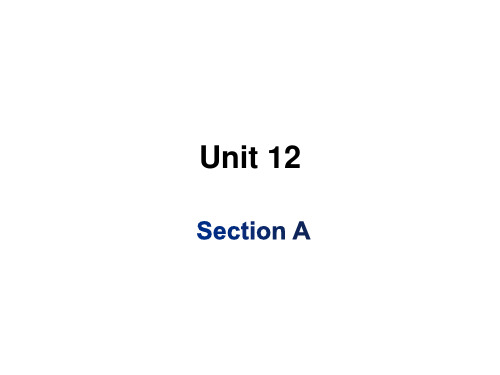
rush v.&n.仓促;急促 rush to do sth赶紧/抢着做某事
eg:They all rushed out to help the old man. rush to...冲/奔向......
1.By the time I got up, my brother _h_a_d___already _g_o_t_te_n_ in the shower. (1b)我 起床时,我弟弟已经进入浴室了。
by the time "在……以前;到.....时候",引导 的时间状语从句若是过去时,主句常用过 去完成时,即"had+动词过去分词"。
Unit 12
New words
• unexpected adj.出乎意料的;始料未及的 • by the time....在......以前 • backpack n.背包;旅行包 • oversleep(overslept,overslept)睡过头;睡得
太久 eg:He overslept and missed the train. • ring v.(rang,rung)(钟、铃)铃;响
4 .By the time she arrived at the airport , the plane ______ .
A .has taken off B .was taking off C. had taken off D. would take off
1.By the time of last term, we ______ all the lessons.
人教版九年级英语unit12知识点,单词讲解

人教版新目标英语9年级全册讲解-Unit 12 Unit 12 Y ou’re supposed to shak hands. 重点、难点、考点及疑点注释重点、难点、考点及疑点注释1. Y ou’re supposed to shake hands.(P94)你们应该握手。
你们应该握手。
be supposed to 用来表示根据规定或按照法律人们不得不做的事,或期待将要发生的事,与should 相似,后面也是接动词原形。
否定形式在be 动词后加not ,常表示禁止做某事。
,常表示禁止做某事。
We’re supposed to make no noise in class. 在课堂上我们不该发出噪音。
在课堂上我们不该发出噪音。
We’re supposed to start work at 8∶00 every morning. 我们应该每天早晨八点开始工作。
我们应该每天早晨八点开始工作。
2. Spending time with family and friends is very important to us. (P96)与家人和朋友共度时光对我们非常重要。
与家人和朋友共度时光对我们非常重要。
Spending time with family and friends 是动名词短语,在本句中作主语。
动名词是动名词短语,在本句中作主语。
动名词(短语)作主语时,谓语动词要用第三人称(短语)作主语时,谓语动词要用第三人称单数形式。
如果是并列的动名词(短语)作主句时,谓语动词用复数形式。
单数形式。
如果是并列的动名词(短语)作主句时,谓语动词用复数形式。
Reading in bed is not good for your eyes. 在床上看书对眼睛不好。
在床上看书对眼睛不好。
Reading and writing take me a lot of time. 读书写作花了我不少时间。
读书写作花了我不少时间。
- 1、下载文档前请自行甄别文档内容的完整性,平台不提供额外的编辑、内容补充、找答案等附加服务。
- 2、"仅部分预览"的文档,不可在线预览部分如存在完整性等问题,可反馈申请退款(可完整预览的文档不适用该条件!)。
- 3、如文档侵犯您的权益,请联系客服反馈,我们会尽快为您处理(人工客服工作时间:9:00-18:30)。
Unit12 Life is full of the unexpected.
【重点短语】
1. take a shower 淋浴
2. leave my backpack at home 把背包忘在家里
3. get back to school 返回学校
4. start teaching 开始教学
5. go off 响铃
6. rush out the door 冲出房门
7. give sb a lift 捎某人一程
8. miss both events 错过两个事件
9. be about to do sth 正要做某事
10. stare in disbelief at 难以置信地盯着
11. raise above the burning building 从正在燃烧的楼上升起
12. jump out of bed 跳下床
13. collect the math homework 收数学作业
14. show up 赶到,出现
【重点句型】
1. By the time I got up, my brother had already gotten in the shower. 当我起床时,我哥哥已经进了浴室了。
2. By the time I got outside, the bus had already gone. 当我出来时,公汽已经走了。
3. When I got to school, I realized I had left my backpack at home. 当我到达学校时,我才意识到我把背包忘在家里了。
4. By the time I walked into class, the teacher had started teaching already. 当我走进教室时,老师已经开始讲课了。
5. By the time I arrived at the party, everyone else had already showed up. 当我到达晚会时,其他的每个人都已经到了。
6. When he put the noodles into the bowl, he realized he had forgotten to add the green beans. 当他把面条放进碗里时,他意识到他忘了添加绿豆荚了。
7. Before she got a chance to say goodbye, he had gone into the building. 在她得到一个向他告别的机会之前,他已经进入楼房了。
【考点详解】
1. By the time I got outside, the bus had already left. 当我出来的时候,公共汽车已经走了。
by the time作连词引导时间状语从句,当从句用一般过去时,主句用过去完成时;当从句用一般现在时,主句用一般将来时或将来完成时。
如:By the time he was ten, Tom had built a chemistry lab himself. 等到了十岁的时候,汤姆自己建了一个化学实验室。
I’ll be in bed by the time you get home. 你到家时,我已经上床睡觉了。
2. When she got to school, she realized she had left her backpack at home. 当她到学校时,她意识到她把背包忘在家里了。
表示“把某物忘在某处”要用词组leave sth in/on/at...
如:I've left my umbrella at home. 我把伞忘在家里了。
I left my book on the desk. 我把书忘在桌子上。
forget意为“遗忘某物”,指忘记一件具体的东西,但不能有具体的地点。
如:I forgot my umbrella yesterday. 我昨天忘了带伞。
Don't forget the cases. 别忘了带箱子。
3. Last Friday night, my friend invited me to his birthday party.
上周五晚上,我朋友邀请我参加他的生日晚会。
invite sb. to a place(或一活动、聚会)意为“邀请某人到某一地方或参加某一活动”;而invite sb to do sth. 意为“邀请某人做某事”。
如:I think we have many friends now, and we must invite them to our place. 我想我们现在有很多朋友了,我们也应该邀请他们到我们家做客。
Kitty’s teacher Mr Wu invited me to join their school trip to the World Park. 基蒂的老师吴老师邀请我参加了去世界公园的学校郊游活动。
4. Wells made it sound so real that hundreds of people believed the story and fear spread across the whole country.
威尔斯讲述这个新闻起来如此的真实,以致成百上千的人都相信了这个故事,进而引发了全国性的恐慌。
so…that...在此引导结果状语从句,so后面应加一个形容词或副词,意为“如此……以至于……”。
如:This book is so interesting that everyone in our class wants to read it. 这本书是如此的有趣以至于全班同学都想看看。
(so+形容词)
He ran so fast that I couldn't catch up with him. 他跑得那么快,以至于我跟不上他。
(so+副词)
【重点语法】
比较一般过去时和现在完成时的异同
1. 共同点:动作都是在过去完成。
I saw the film yesterday evening.
I have seen the film before.
(看电影这件事都是在过去完成的。
)
2. 区别:
①现在完成时强调过去发生的动作对现在的影响和结果,而一般过去时与现在没有联系,只是说明某个动作发生的时间是在过去。
②一般过去时通常与具体明确的过去时间状语连用。
如yesterday, last week , two years ago,just now,in 2002 等;而现在完成时则常与just ,already ,ever ,never
等模糊的过去时间状语和these days ,this week ,since..., for... 等表示一段时间的状语连用。
